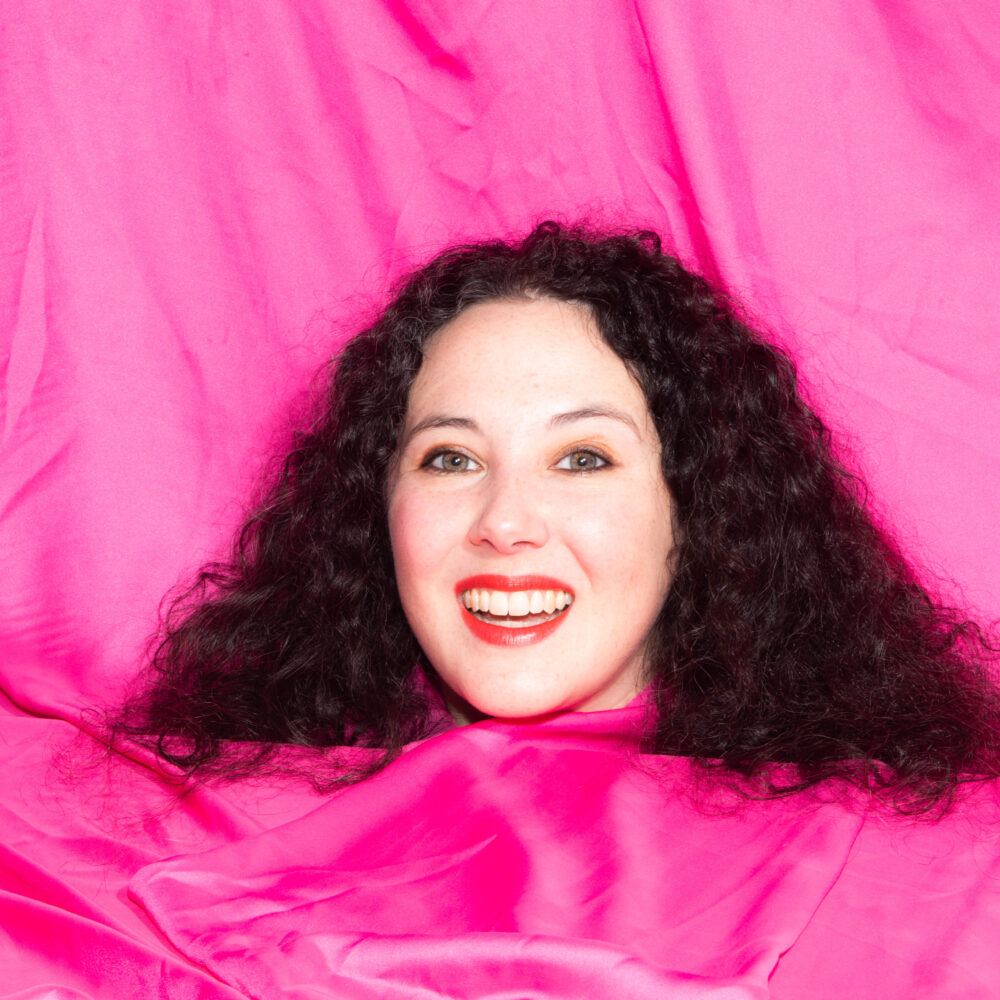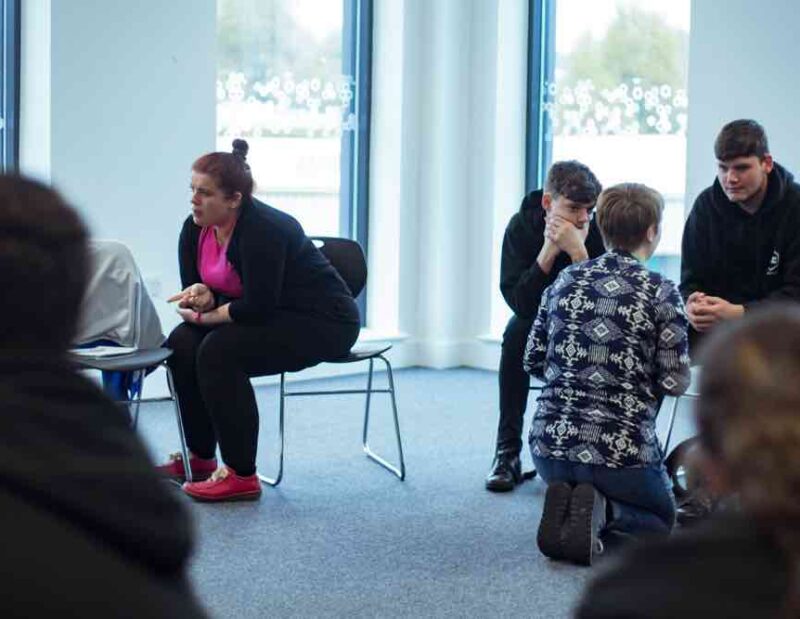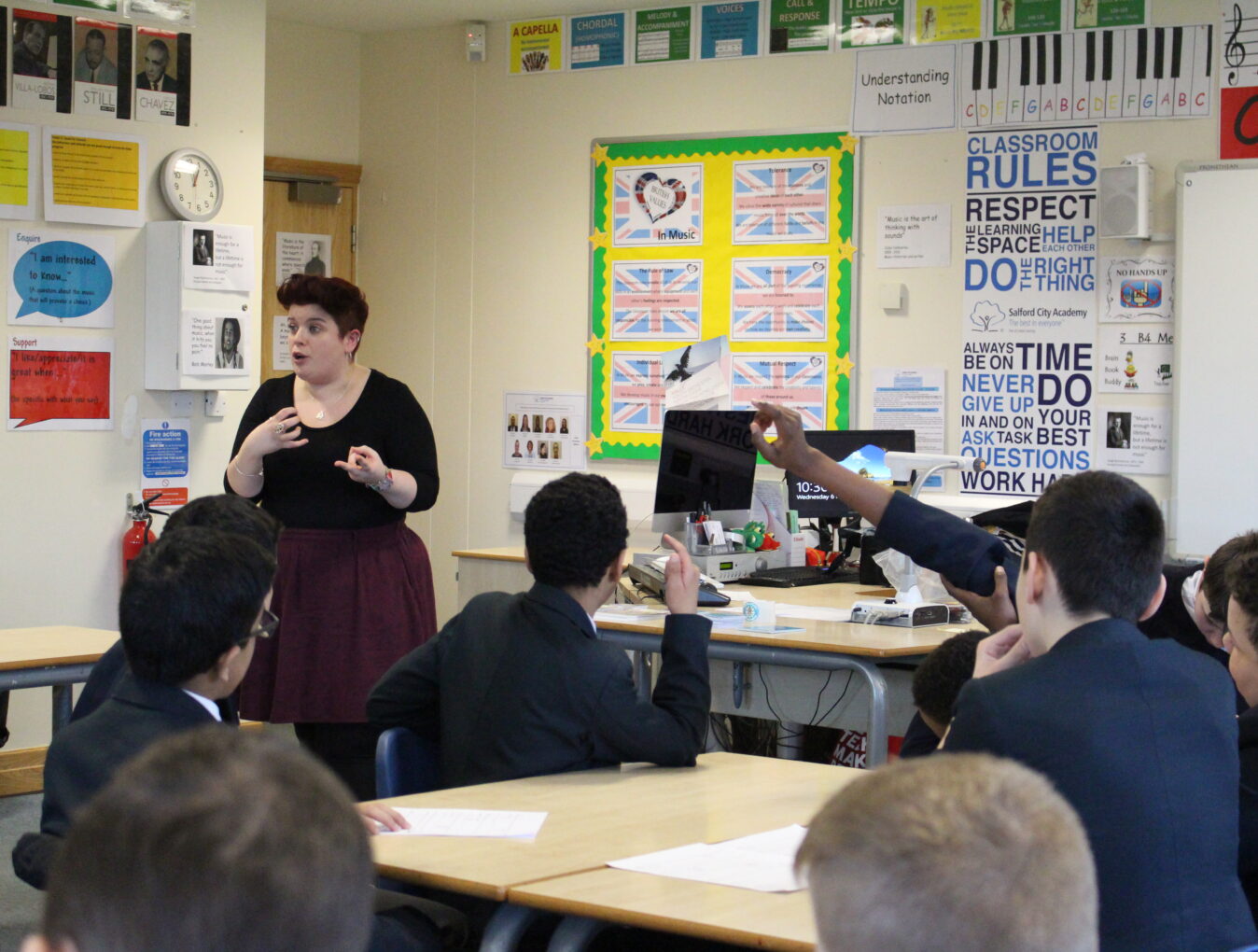



‘So, I don’t know about you, but I can’t think of a better way of celebrating LGBTQ+ History Month than donning an Art with Heart t-shirt, getting up at the crack of dawn with Sarah Emmott and venturing across the schools of Greater Manchester to talk ‘Equalities’.
Art with Heart have been delivering Equalities workshops in schools for several years now, talking with thousands of young people about the history of LGBTQIA+ rights, equality in the present day and rallying young people into action. I could not wait to begin. Young people: we need you.
Off we went, backpacks on, lunchbox rammed, Equalities notebooks in hand. I joined Sarah for just 4 visits to schools and in that short time I personally met around 500 young people. In these hour long snatches of time, conversation about equality ran wild. Young people initiated conversations about LGBTQ+ people being killed worldwide, the gender pay gap, class inequality, footballers being racially abused, why Philip Scofield has only recently come out, teenagers being treated like criminals, teachers being transphobic and Chinese people being attacked in the wake of coronavirus.
We talked about how much our parent’s opinions influence us, how events in history impact us now, and how the more you know, the more you have acceptance.
We talked, we listened, we disagreed and we said how we really felt.
At one point we were talking about the stats regarding high proportions of white men in CEO positions. A white boy put his hand up to say ‘I get the point, but maybe those men just worked really hard to get where they are’. A black boy raised his hand in response, ‘I respect what you’re saying but the thing is, if you’re a black person and you have less money, less opportunities (because that’s just the way things are), then even if you work really hard you’re not going to have same the chance to get there’. The point was noted. The first kid thought about it and nodded. And then the conversation carried on.
I just stood there stunned – this ability for young people to articulate themselves, listen and respect each other -being open to having their point of view changed and that compassion to trust each other’s ability to empathise.


We took time to focus on LGBTQIA+ equality specifically. We talked about wanting to come out to parents, how to help a friend and what it’s like to be trans in a same-sex school. We talked about things being against religion, looking after yourself first and asked why there isn’t a parade for being straight.
One session concluded ‘it must have been well tight on Chris Smith’ to have such pressure as the first openly gay MP, another that ‘it’s stupid that being trans was labelled a mental health condition – like LAST YEAR?’ and just the hugest resounding ‘noooooooooooo’ at the knowledge that the first same sex marriage happened in Northern Ireland that exact month – Feb 2020.
The thing which stuck in my throat was reading through a timeline of UK LGBTQIA+ history and realising that Section 28 came in force in 1988, without repeal until 2003. I was born in 1988 and was 15yrs old in 2003, meaning that throughout almost all of my state school education, it was illegal to have the conversations we were having in school – you just couldn’t talk about sexuality. And that does something to you. Just not having a clue, being none the wiser, trying to piece your understanding of your sexuality as a teenager through conversations with friends and stuff you see on TV.
When I was at school I used to say ‘that’s gay’ and ‘that’s shameful’ interchangeably, without any concept that I was being homophobic. I remember being in a lesson at school when a girl passed me a note asking me what I thought about the lesbian woman on Big Brother. I genuinely had zero opinion, caught a little off guard I responded with something like: ‘I don’t know, lol’. She said she thought it was really gross and asked if I agreed, so I said something like ‘I suppose so’ – just to fit in. Obviously, she came out years later and I couldn’t stop thinking about that missed opportunity to be a supportive friend or what it was like to have her suspicions incorrectly confirmed: ‘if I come out, everyone will think I’m disgusting’.
When I was younger I definitely wasn’t bisexual because I was attracted to men, and you could either be straight, lesbian or just showing off. I came out in University, then skulked right back in again on the release of Katy Perry’s ‘I Kissed A Girl’ – embarrassed and repulsed at the idea that if I kissed a woman, men would think I was asking to be watched and perved on. Particularly as a survivor of assault, it made me feel sick that my sexuality and sexual actions were for other people and not something I owned – and I carried that feeling late into my twenties.


There’s so much hurt which is caused when people aren’t just allowed to talk, listen, disagree, and talk more. The impact of not having basic access to information or the space to work things out. The impact of having to hold onto shame.
The Equalities workshops were not always easy to have – they weren’t the optimistic ‘we’re going to start a revolution overnight’ call to arms I thought they might have been when we first set off, notebooks in hand – they’re slower than that. But they do something quietly and deeply radical. They offer basic access to facts. They nurture the ground which kicks off calls for social change. They open the lid and start a tremor. Young people: you’ve got this.’
Jenny Gaskell
Jenny Gaskell makes performances and participatory art. She is interested in connection, art that happens in everyday places and creating scenarios for people to take agency. Her work involves hosting, listening, writing, gathering people together and thinking about how to hold various types of grief. It is often intimate, tender, funny, conceptual and gives reverence to everyday interactions. Jenny’s headshot is by Layla Sailor.